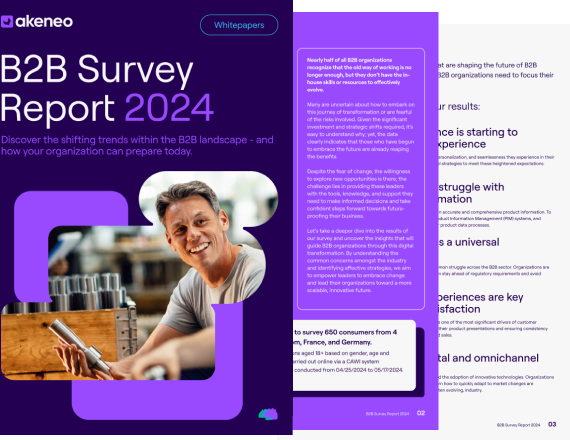Are you ready for the future of B2B sales? Discover the key trends shaping the B2B industry, from the growing influence of omnichannel strategies and AI-driven solutions to the rising importance of sustainability and compliance with evolving regulations. Whether you're looking to optimize customer experiences or stay ahead of market disruptions, we hope you’ll find valuable insights to guide your digital and sustainable journey forward.

Keywords
Every industry undergoes various cycles and updates to its landscape, and the B2B sales sector is no exception.
With the onslaught of new technology, updates, connectivity to customers, and the rapid increase and reliance on digital sales, B2B organizations need to step into the future sooner rather than later. And the future of B2B customer engagements looks increasingly like B2C.
But how can companies adopt a B2C mindset and properly prepare to ensure they are staying competitive in the marketspace? The answer is through adopting a digital strategy and building a strong omnichannel presence. However, with 85% of B2B organizations already implementing a digital sales strategy, time is of the essence and companies need to kickstart their transformations now if they haven’t already.
Embracing the adoption of omnichannel experiences and a digital presence is no small task. Between ongoing regulation changes, sustainability efforts, and incorporating emerging technologies, executing a strong digital transformation can be daunting. By building a strong foundation and embracing changing customer behaviors and patterns as they happen, however, companies can ensure they are set for success and prepared for the future.
A recent Akeneo study found that 90% of B2B organizations are planning to increase their digital sales strategy within the next two years, signaling the urgent need to invest in digital channel optimization and implement cloud-based platforms.
As buyers continue to opt for and prefer digital options in their personal shopping habits, they’re coming to expect this type of personalized, self-service experience in the B2B shopping experience and in fact, nine in 10 B2B organizations reported that they are either already using or planning to use emerging technologies such as Generative AI, voice search, and visual configuration tools within the next 12 months.
While B2B shoppers still appreciate the personal touch of an in-person interaction, digital channels as a whole are able to scale efforts beyond face-to-face meetings and allow companies to connect with customers no matter where they are or what time of day it is, which increases overall efficiency and helps to improve a customer's overall experience. The digital world has allowed customers and companies to connect in unprecedented ways through various interactions across digital touchpoints such as websites, mobile, apps, social media, email, and more.
As we continue on digital transformation journeys, this will only become more popular among customers and buyers, who want to do business on their schedules, which may not be during your business hours. This seamless usability and convenience in the consumer realm is what B2B buyers crave in their business lives, too.
With ever-increasing methods of communication and connection to buyers and customers though, it’s important to ensure that data is being stored in a centralized, cloud-based platform so it’s consistently accessible to anyone in the organization who needs it, whenever they need it. Using a Product Information Management (PIM) solution to organize, enrich, and manage all the data collected helps streamline data processes across the entire organization, making a more seamless experience for both employees and customers.
Unless you’ve been living under a rock, you’ve heard of Artificial Intelligence (AI) and its impact on the shopping journey at some point over the past few years. Not since cloud computing have we seen a technology so poised for market disruption, across nearly all markets, including the B2B sales market.
When it comes to AI, every industry has been integrating it and using it as a way to speed up processing, generate and localize content, assist with data and search, and more. AI has proven itself to be instrumental when it comes to data analysis, and for the B2B industry, it will only continue to be of assistance. With these customer expectations evolving at a rapid rate, B2B organizations will need to invest in an AI tool that can properly and quickly sift through large amounts of data to provide insights on market trends, customer behavior, and operational inefficiencies.
The Akeneo study also found that the primary perceived benefit of AI for the B2B industry is the speed of time to market through automation. As companies are using AI to assist with things like advanced data analysis and predicting operational disruptions such as inventory, processing roadblocks, or potential supply chain management issues, they’re able to save valuable time and get products to market at a faster rate, providing an even bigger competitive advantage.
Sustainability is at the top of customers’ and businesses' minds, and it’s not going anywhere any time soon – 66% of respondents in our B2B survey agreed that product and brand values are most likely to grow in importance over the next 2-3 years. As regulations continue to grow around sustainability and transparency, the demand for compliance, corporate responsibility, and competitive differentiation is also front and center.
Consumer brands have undergone significant changes in order to meet the demand for increased sustainability and transparency, and B2B buyers are following suit. Many organizations have started factoring their environmental impact into decisions and are making more of an effort to be transparent about their sustainability to consumers.
An example of this is the growing popularity of Digital Product Passports (DPP), which are digital records that aim to gather data on a product and its supply chain so that all stakeholders, manufacturers, repairers, and consumers better understand the environmental impact of the materials and products they use. While DPPs are ‘nice-to-have’ at the moment, they are expected to be made a requirement for many businesses starting in 2026 under the European Green Deal.
Building a strong foundation for sustainability will assist in keeping up with changing regulations, values and behaviors, and compliance standards. As governments continue to introduce new and stricter guidelines for sustainability, B2B companies will need to ensure they are up-to-date and staying ahead of the game.
Reducing carbon emissions, focusing on increasing sustainable practices, sustainability reports, and visibility into their carbon footprint are all necessary ways to comply with standards. Plus, ensuring that a brand or company is on top of its sustainability operations and efforts can also provide a unique competitive advantage in today’s saturated marketplace.
The future of B2B sales is rapidly evolving, with a growing emphasis on digital transformation, omnichannel engagement, and sustainability. As customers increasingly expect seamless, personalized, and self-service experiences similar to those in B2C interactions, B2B organizations must act quickly to adapt.
By embracing emerging technologies like AI, centralizing data for optimized efficiency, and aligning with sustainability regulations, businesses can not only meet customer expectations but also position themselves for long-term success.
Now is the time for B2B companies to innovate and invest in these critical areas to stay competitive in the ever-changing market landscape, as those who embrace these shifts today will be the leaders of tomorrow.
Download the comprehensive report based on the findings of our survey of B2B professionals to receive insights and actionable tips on navigating the tricky waters of the B2B industry.


The circular economy presents a powerful opportunity for businesses to align sustainability with profitability by minimizing waste, maximizing...
Read more
Discover what makes Akeneo more than just a workplace. From fostering a culture of care and work-life balance to providing opportunities for growth...
Read more
2024 has been a year to remember for Akeneo. For the third day of PXMas, we’re sharing the stories behind just a few of the prestigious awards...
Read more